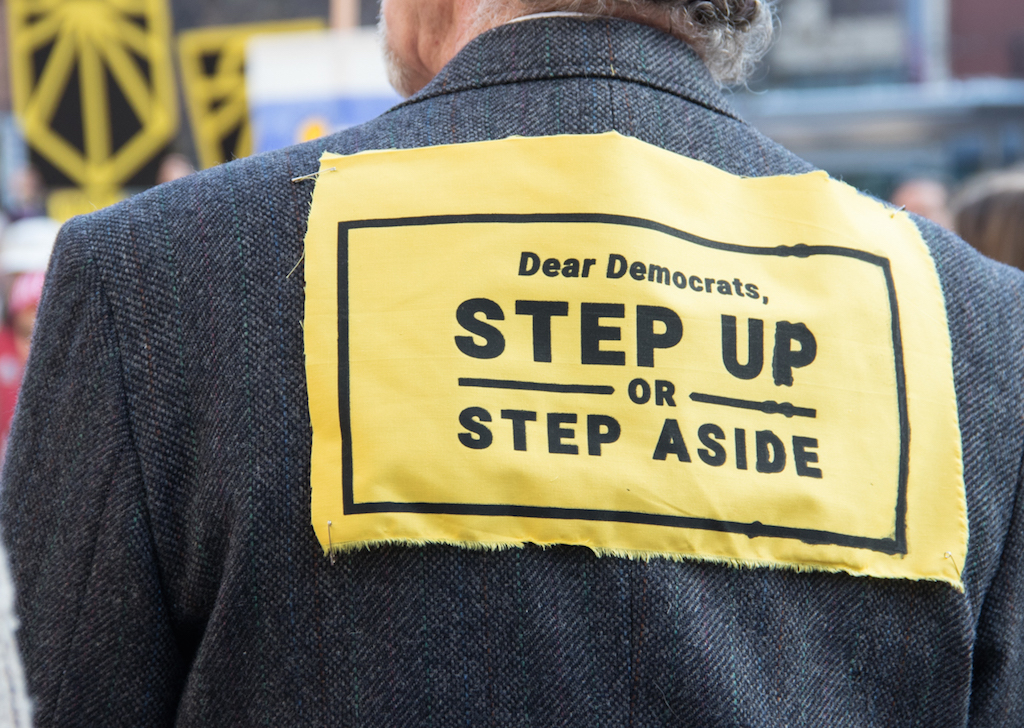There are a number of ecosocialist responses to the Green New Deal, converging for the most part around the recognition that though it is not the Green New Deal most of us would prefer, it is the opportunity to move the paralysis of the climate change movement very far in the right — left — direction that our times so desperately need.
This is a series of essays in six voices, from longtime activists who participate in the North American ecosocialist network System Change Not Climate Change. Each was challenged to make their point in 500 words or less. It was intended as a constructive contribution to the wonderful storm of discussion that the Green New Deal has opened up. Read the full series here.
This is it. Either we demand what we actually need and build an in-the-streets movement to win that, or we kiss our future goodbye. The Green New Deal will be either our final illusion or a gateway to survival.
What we actually need.
Certain things need to happen asap.
1. Fossil fuels need to stay in the ground. Nothing else matters if we don’t turn the spigot off.
2. We must implement a comprehensive plan including:
- Vast deployment of renewables
- Huge reductions in military activities
- A radical revamp of agriculture
- Ending the production of unneeded products and our reliance on the growth of these as a measure of economic health
And much more. For these things to happen, we need public ownership of major industries, under democratic control. Fossil fuel corporations aren’t going to put themselves out of business. And how can we possibly implement a huge and complicated plan to transform society without being in the driver’s seat?
We also need guaranteed economic security for every person, including good jobs, good incomes, free health care, and more. To support and shape planet-saving initiatives people can’t be beholden to corporate employers.
What we might get instead.
A Green New Deal law based on the current U.S. resolution will likely fall well short of what’s needed:
- Fossil fuel extraction may continue. (The resolution doesn’t mention fossil fuels. Historically they’ve skyrocketed even as renewables were promoted, including under Democrats.)
- Certain green projects will advance but we won’t see the truly comprehensive plan we need.
- Unneeded products will still be massively produced. Greenhouse gasses (GHGs) from these and from “green capitalism” could rise. The resolution promotes “massive growth in clean manufacturing,” only limiting emissions to what is “technologically feasible.”
- Military activity will remain a major source of GHGs.
Some say that even a highly flawed GND deserves support, because it moves us forward. But gains could be cancelled by losses from manufacturing, wars, fossil fuel extraction, etc. More importantly some progress is not enough. We need enormous progress to avoid catastrophe. Perfect is not the enemy of the good here. The good is the enemy of survival.
Gateway to survival.
We should declare enthusiastic support for the Green New Deal concept, while noting that the current language is entirely inadequate and must be strengthened. The Green New Deal must incorporate what we actually need.
We must prioritize building a working-class movement capable of mass strikes and other militant actions.
Lobbying and electoral strategies are ineffective in the absence of such a movement. Ultimately, this organizing will also birth the political party we need. We should regularly expose Democratic Party betrayals to facilitate that.
Building a working-class movement is the only way forward. We must connect with unions, other workers, Indigenous peoples, disproportionately affected communities, students, and groups focused on issues like poverty and health care. We must commit to economic security for all as a non-negotiable element of any Green New Deal we support. And we must work with our allies to flesh out what a Green New Deal looks like in our localities and beyond.
Carol Dansereau is an environmental attorney/organizer based in Seattle. Her years as a nonprofit staff person include a decade helping farm workers fight pesticides, another decade at the Washington Toxics Coalition, and stints with environmental organizations in D.C. and Michigan. Dansereau now organizes free from the censorship associated with nonprofit employment. She joined System Change Not Climate Change to connect with others who understand that we can’t create a just and sustainable world without first getting beyond capitalism. Dansereau is the author of What It Will Take: Rejecting Dead-ends and False Friends in the Fight for the Earth.
This article was first published on Resilience.org.
Photo: Peg Hunter/Flickr
Help make rabble sustainable. Please consider supporting our work with a monthly donation. Support rabble.ca today for as little as $1 per month!




